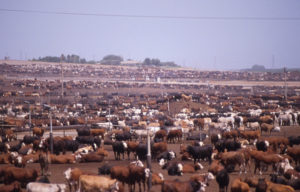
US Feedlot Beef production © Socially Responsible Agriculture Project
The dreaded ‘red tape’ and interference in farm decisions under the European Common Agricultural Policy (CAP) is why many UK farmers voted ‘leave’. But I aim to justify the uncomfortable but necessary complexity we will need to cope with after Brexit when we have a new contract or agreement between farmers and the taxpayer.
It is the elephant in the room. Farmers, NGOs and even new DEFRA head Michael Gove MP is talking up a new farm support system after Brexit where we deliver public money for public goods, productivity, rural resilience and so on. Sustain has published its ideas as have many NGOs. Yet we all keep relatively silent on the hard reality that any such scheme will need to have some pretty great rules, paperwork and enforcement.
We’ll need what could be described as a rather detailed ‘housemate agreement’ so we can live together relatively happily on these crowded isles with all the competing demands being agreed together. Farmers in other countries aren’t always subject to the type of housemate agreement the public wants to see here – they are free to trash their room, let the fridge turn into a biohazard zone, and drive their motorbike into the kitchen.
But can we really have what we are asking for – menus of options, light or dark green payment schemes, broad and shallow, local new markets for natural services and more flexibility and so on, all underpinned by strong but fair regulations – without a more intricate, complex agreement?
Not really. We live squished together on this tiny island with little room to swing a sheep. This is rather unlike, say, the US where space and distance mean few care or check enough and their vast national parks remain (mostly) pristine to be visited and loved. Here we need more care to keep everything humming relatively smoothly; or at least with as little conflict, harm and a decent level of oversight.
We need to find ways to live together with more complicated rules than if we were living far apart. This ‘housemate agreement’ between farmers and the rest of us needs to be tested, flexible, under review and proportionate. Leaving the lid off the bins is only a minor infraction; poisoning the water supply not so much. Treating livestock in a way deemed cruel or unsafe would be a red line in the agreement; and so on…
We need to embrace this reality rather than be scared of it and not let the ease with which schemes will be administered, controlled and verified be the main criteria for choice of scheme.
Certain farm systems like organic have been through the process of developing a comprehensive ‘contract’ and they’ve come out the other side of 50 years of development with a system based approach that is rather handy – a prescription for the whole farm with known results for soils, nature, welfare and so on. It does not lack complexity but organic farmers agree to it because they have a whole-farm, knowledge-based system and gain both from the process and in the market place.
I’ve yet to find anyone keen on saying we want more red tape and most people in the farm policy world say the CAP was too costly, ineffective and too complex. I’ve said that myself many times. The recent EU introduction of the three crop rule – which the ex DEFRA Secretary of State said they’d drop – was interference too far for most farmers here and for some, may have triggered a leave vote. The rule was to diversify cropping to protect over-used EU soils and stop monocultures taking root in Europe which reduce biodiversity, and increase fertiliser use. It was an admirable aim for systemic shifts yet maybe poorly designed. One study suggests the overall impacts, good and bad, are small. We can do better.
But we are just going to have to be realistic. The three crop rule was too simple in design and probably did not fit the farm and landscape scale needed. And taxpayer support will not come without strings- they will want to see results. An agreement will give farmers some decent financial reward in return for some specific actions (for instance to enhance farm biodiversity) plus some form filling and inspections.
As a result, ideally, farmers should get a decent living via the market (and we need better rules there via extending the Grocery Code Adjudicator and other policies) and via taxpayer support for what the market won’t pay. The time taken to do form filling and inspections could be calculated and covered in the agreement. Skills development, mentoring, training and advice also need to be on tap and financed. Let’s get this right. We have time in a transition period, to test and pilot; before the new scheme is due to go live in 2022.
Yes farmers don’t like form-filling, red tape etc. That’s understandable. I also understand that a certain number run unsuccessful businesses – failing on so many counts they maybe should leave farming after Brexit. Their holdings may be swallowed up by another farm, or far better still, available for new entrants or family members better able to deal with new era of markets and a new agreement with taxpayers. If that is a quarter of UK farmers that’s, say 54, 000 businesses that’s a fair few new entrants there…. and the 163,000 current farmers needing to be ready to get into new agreement with the taxpayer, with new, better environmental and health priorities, if they want to.
Finally it is worth remarking that a free trade deal with US is hugely problematic for farming and food. We need that housemate agreement but as noted many farmers overseas will have no such restrictions and can pollute, overstock and spray rather how they want. To stretch the housemate analogy, they don’t even have to empty the bins every other Friday.
Some of our animal welfare and food standards have been long fought for and should not be compromised in order to make a deal with US. Some farmers here may be lucky or big enough to compete and gain a new or bigger market via new trade agreements and may decide they don’t need taxpayer support but they will still need to adhere to baseline legal standards. How much better to embrace the new era and get a positive, forward thinking, ideally multi-annual agreement with the taxpayer. This will help to protect this crowded island, its population and its precious soils, landscapes and wildlife.
Vicki Hird is Campaign Co-ordinator for Food and Farming Policy at Sustain

Comments are closed.